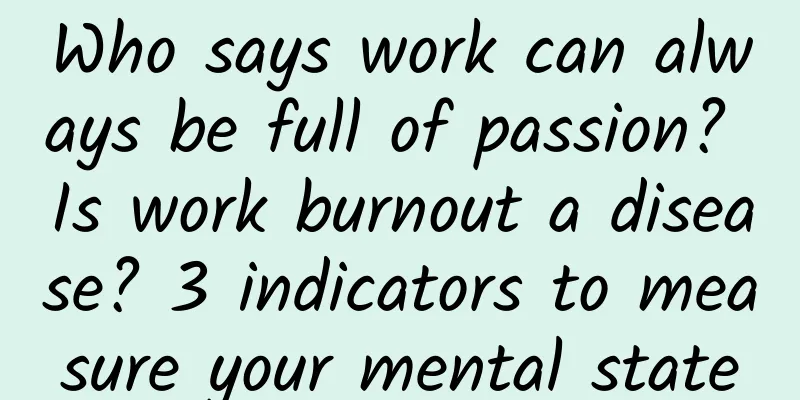Who says work can always be full of passion? Is work burnout a disease? 3 indicators to measure your mental state

|
According to media reports, when Li Jiaqi was promoting a Huaxizi eyebrow pencil in his live broadcast, a netizen commented that "Huaxizi eyebrow pencils are getting more and more expensive". Li Jiaqi reminded consumers to look for the reasons within themselves. On the evening of September 11, he cried and apologized in the live broadcast room, saying, "What I said was very inappropriate and disappointed everyone." Some netizens believed that he was showing signs of burnout and anxiety. What is burnout? From a psychological perspective, occupational burnout is also known as "occupational exhaustion syndrome," which is a phenomenon of energy exhaustion caused by improper working methods, excessive work pressure, etc. People who suffer from occupational burnout often feel overwhelmed by work, exhausted physically and mentally, and depleted of energy. According to the internationally recognized definition, the three indicators for measuring occupational burnout are: emotional exhaustion, cynicism, and low sense of accomplishment. Relevant data show that about 70% of employees in my country currently show symptoms of occupational burnout to varying degrees. Occupational burnout is more likely to occur in the early stages of employment, and the incidence of burnout among employees under 30 is higher than that among those over 30. Rationalists, perfectionists, and people with obsessive-compulsive tendencies are more likely to suffer from occupational burnout; the incidence of occupational burnout is also higher for some people who are overloaded with work, often work overtime, or whose income level does not meet their requirements. Generally speaking, burnout can be caused by the following reasons: 1. Choosing an unsuitable career. "Choosing the wrong career" is a common cause of job burnout. The inducing factors, especially for some college graduates, are that they "cast a wide net" and send resumes everywhere when looking for a job, and finally find a job in a confused manner. However, after working for a while, they find that they do not like this job, which leads to occupational burnout. 2. Imbalance in work content or workplace environment, such as salary not meeting expectations, conflict between one's own philosophy and the company's philosophy, or unfair treatment. 3. Excessive workload. 4. Lack of work autonomy. In fact, for office workers, job burnout is not a "new thing", most office workers have experienced job burnout to a greater or lesser extent. Although job burnout is common, it should not be taken lightly, because if it is not regulated, it may cause negative emotions such as depression and distress, and even lead to mental illnesses such as depression. So, how do you deal with burnout? 1. Don't regard work as "the only thing". Work is not the only meaning of life. You should also know how to enjoy life after work. If you feel that the work pressure is too high, you should relieve the pressure in time. Listening to music, watching movies, chatting with friends, etc. are all good ways. 2. Treat the impulse of "job hopping" rationally. If you have the idea of job hopping, you should think carefully and not act on impulse, because reasonable job hopping can alleviate professional burnout, but frequent and irrational job hopping will make the situation worse. If you find that you still have professional burnout after multiple job hopping, you should rationally examine your career needs and abandon unrealistic ideas. 3. Learn to motivate yourself. Work autonomy is negatively correlated with job burnout, which means that improving work autonomy and enthusiasm can alleviate job burnout. Here are 4 ways to motivate yourself: (1) Find intrinsic motivation: Don’t think of work as just a chore. You should find your intrinsic motivation for work, such as whether your work can help you realize some of your ideals or help you take on certain responsibilities. Only in this way can you gain continuous motivation. (2) Set short-term goals: Break down long-term goals into several short-term goals to gain continuous work motivation. (3) Seek work feedback: Actively seek feedback from superiors or colleagues. This will not only improve your work ability but also help you find the meaning of your work. (4) Improve your skills: Constantly “recharge” yourself to meet new work requirements. |
Recommend
Typhoon "Little Dog" + cold air, be careful on your return trip!
As the holiday draws to a close, precipitation in...
JD Logistics Financial Report: JD Logistics Revenue Reached 182.8 Billion Yuan in 2024, a Year-on-Year Increase of 9.7%
JD Logistics released its 2024 annual performance...
What is the "dark" candied haws? Take a look at China's "first string" of candied haws!
Winter is coming The best season to eat candied h...
Help! It’s so hard to get up in winter… How can I get up quickly and painlessly?
Planning and production Source: Curious Doctor Ed...
The role of dried black wolfberry
There are many types of wolfberries. What we ofte...
The efficacy and function of Niubaiteng root
I don’t know if you are familiar with the root of...
Potatoes can cause poisoning if kept in the refrigerator...Do vegetables really need to be kept in the refrigerator?
Source: A Brief History This article has been aut...
30% more contagious than Omicron! Super mutant coronavirus strain lands in South Korea
◎ Science and Technology Daily reporter Xue Yan S...
The efficacy and function of Zhuling grass
Zhulingcao is a medicinal herb that can treat man...
Soak your feet in Huoxiang Zhengqi water to remove moisture
In our daily life, Huoxiang Zhengqi Water is a co...
Why do we have multiple languages in our dreams?
© Emmanuel Lafont Leviathan Press: I remembered a...
The efficacy and function of fragrant vine root
Fragrant vine root is a relatively common herbal ...
Melon with Scallion and White Wine Soup
Trichosanthes, Allium macrostemon and pure grain ...
Tooth extraction can really kill you! From hammering teeth to minimally invasive techniques, here's a look at the evolution of human tooth extraction surgery!
Tooth extraction is a "terrifying" oper...
The efficacy and function of boleng melon
For Chinese medicinal materials such as pear melo...









